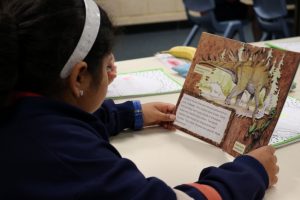Literacy at Campbell Primary School
Literacy learning at Campbell Primary School underpins every facet of our school curriculum. All teachers are charged with the goal of encouraging lifelong learners and lovers of literacy. The school has an English business plan that aims to produce students who are confident and articulate speakers, attentive and active listeners, accomplished and critical readers and confident writers.
Students in the Early Years begin their literacy education with a focus on the development of oral language skills, the necessary precursor for the development of written literacy skills. Students learn about narrative, conversational conventions, vocabulary development, phonological awareness and semantics through explicit small group teaching and regular practise through games and role plays. Students then progress towards formal reading and writing through the use of an eclectic approach that includes language experiences, modelled and shared reading and writing with a focus on the development of a love of language and literature.
The school has implemented Guided Reading across all year levels, allowing all students to benefit from small group instruction tailored to meet their stage of development.
An increased emphasis on evidence based assessment has honed curriculum delivery and resulted in significant improvements in literacy across the school.
NAPLAN results confirm high levels of achievement in all areas of the English curriculum.
The school regularly holds workshops for parents on assisting children to read, write and communicate, and encourages parents to share in classroom activities after these sessions. Classrooms celebrate English learning through bright displays of student work, sharing of work at assemblies, articles in the school’s newsletter and the publishing of student work on class pages within the school website.
Campbell Primary School Home Reading Initiative
Purpose: Reading is a crucial life skill and delivers wide reaching education value for children.
Research shows that reading 15 minutes each day seems to be the “magic number” at which students start seeing substantial positive gains in reading achievement; students who read just over a half-hour to an hour per day see the greatest gains of all. The impact of reading 15 minutes per day over many years supports students to achieve their potential across all academic areas.
As a part of our Homework policy, we recommend all students read at least 4 nights per week. Ideally students read or are read to every night. Students are expected to maintain a reading log where an adult confirms their child has read by signing the log.
Teachers will be maintaining a log in classes to tally the number of nights each student has read over the year.
To motivate students to read frequently, we are introducing an incentive system whereby students receive a Reading Star ribbon for each 25 nights they read. Once a student reads for 100 nights,
they will receive a Reading Star badge. Ribbons and badges will be distributed in classrooms by the classroom teacher.
Along with this home reading initiative Campbell Primary School has commenced a Parent Reading Volunteer program to support our P-2 students with access to daily reading.
We will also continue with our Holiday Reading Challenge each holiday break with incentives and book prizes for students who complete the challenge.
Resources for Parents
There are many ways parents can support children in reading. Please click on the links below for additional information.
Never Stop Reading for EAL/D Families
Reading with your child is important – Kindergarten
Reading – Reading stages – Kindergarten
Reading – Reading with your child is important – Pre-primary
Reading – Reading stages – Pre-primary
Reading – More reading ideas – Pre-primary
Reading – Reading with your children is important – Years 1-2
Reading – Reading stages – Years 1-2
Reading – Learning at home – more reading ideas – Year 1 – 2






